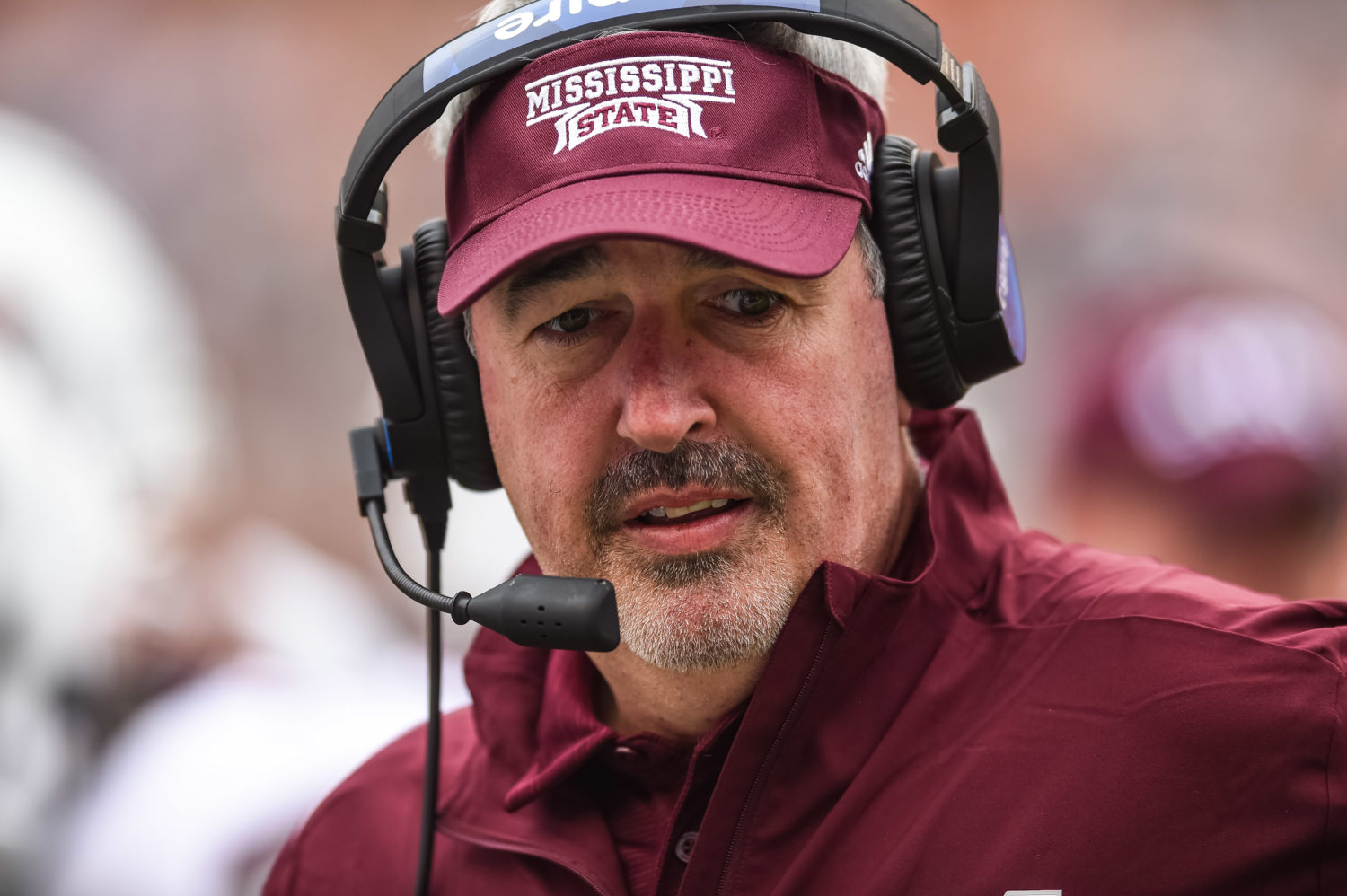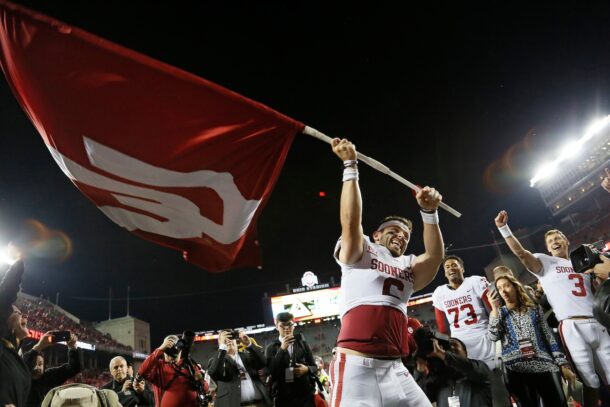
Do fans like it? Sure, but firing Joe Moorhead the way it did after 2 years was a bad move by MSU
Two years, 2 Egg Bowl wins, 2 bowl games.
Two years, 2 bowl losses, 2 disappointing seasons.
One bizarre Egg Bowl win, 1 “they’ll have to drag my Yankee ass” press conference comment, 1 disastrous bowl season.
One firing.
Joe Moorhead’s time at Mississippi State ended in some of the most bizarre fashion you’ll ever see. An Egg Bowl win that happened in part because Elijah Moore’s dog pee celebration was what helped MSU to get to a bowl game … where a now infamous post-practice fight involving quarterback Garrett Shrader and linebacker Willie Gay and a disastrous collapse to Louisville appeared to be the undoing for Moorhead.
Bizarre, indeed. It’s a move that on the surface to MSU fans who watched the program reach new heights under Dan Mullen probably will sign off on.
You can say Moorhead disappointed. You can say he wasn’t Mullen 2.0. You can say you had serious concerns about him as the long-term guy.
But should MSU have fired Moorhead after a bowl game in Year 2? Absolutely not.
This move was reckless and reactionary. It came off like a move made from an athletic director who spent too much time around frustrated boosters and angry MSU fans on the internet. It came off like a move from an athletic director who looked across the state and saw a splashy hire made, much like a kid getting jealous of their sibling’s Christmas presents.
Moorhead didn’t deserve to be fired after just 2 seasons in Starkville, no matter what Twitter tells you.
John Cohen reportedly claimed Moorhead “wasn’t the right fit” at MSU. That’s an interesting way to justify firing a coach who didn’t have ties to the South, which was part of the skepticism for when he was hired. Someone who spent the majority of his coaching career in the Northeast took over an incredibly talented team and won 8 games, which was indeed a disappointment by his own high standards (he admitted that telling players to “get their ring sizes” upon arrival was a mistake).
Still, though, he clearly didn’t lose control of that locker room:
Y’all are trippin if you think Moorhead isn’t a good coach 🤷🏽♂️
— Nick Fitzgerald (@nickfitz07) January 3, 2020
Lost in the shuffle of that season was that it was tied for the most wins ever for a 1st-year MSU coach, and that the Bulldogs were ranked heading into last year’s Outback Bowl loss. Overlooked was that the biggest question facing Moorhead — how was he going to recruit in the South — was answered with a Top 25 class in his first full cycle. Moorhead was in position to do that again in 2020.
Now, all of that is up on the air. Cohen made the atypical move of waiting until after the Early Signing Period, which is morally wrong in itself. Basing that decision on the events of a Monday afternoon bowl game seems, well, weak. And if you’re convinced that this was a result of the NCAA probation that MSU was put on because of academic fraud involving MSU players, tell me why Moorhead wasn’t fired after the regular season.
Cohen botched this decision. The timing, the reasoning, the everything.
Sure, Arkansas and Florida State fired its coaches in the midst of their 2nd seasons, but this was by no means a common move. From 1990-2018, only 6 Power 5 programs fired their head coach before the start of their 3rd seasons (according to Sports Illustrated’s Ross Dellenger).
Comparing MSU’s situation to Arkansas and FSU would also lack context. Arkansas went 2 years without winning an SEC game and lost to the likes of Colorado State, Western Kentucky and San Jose State under Chad Morris. FSU saw the nation’s longest bowl streak end under Willie Taggart in Year 1, and he was off to a 4-5 start in Year 2 after a 17-point home loss to rival Miami.
Say what you want about Moorhead — he set the bar too high, his passing offense struggled, etc. — but don’t tell me his 2 years were on that level of awful. They weren’t. And MSU isn’t Florida State. Even Bulldogs fans can admit that (MSU won 14 games in a 5-year stretch in the 2000s). Well, at least the ones without agendas would admit that.
A program with 1 winning season in SEC play in the 21st century is kidding itself if it suddenly thinks it’s going to start cranking out 10-win seasons in the toughest division in college football. There’s a fine line between “accepting mediocrity” and “thinking you’re something you’re not.” This move makes me think MSU is more the latter right now. That’s a scary place to be in this sport.
MSU, like it or not, has a ceiling. Mullen raised it. When Moorhead was hired, I banged the drum that he was going to continue to raise it. I called it a “home-run hire” after watching closely what his offenses did at Penn State. I was wrong about that, and I’ve since eaten crow. Cold-take me, if you wish.
But this move still came too soon. MSU was still going to fill those seats next year, regardless of the widespread belief that Moorhead would have entered the season on the proverbial hot seat. Pulling the plug on a 14-12 coach who went 7-9 in the SEC was the product of Cohen wanting a do-over instead of having faith that Moorhead could improve in Year 3.
Cohen won’t admit this, but he’s lying if he says he didn’t want a chance to win back the court of public opinion. He knew that fans would get on board with him “dragging Moorhead’s Yankee ass out of there” and as a result, he’d get a chance to save his own job.
I’m not saying Moorhead’s lack of Southern roots were his undoing because obviously Mullen once had limited Southern ties (outside of being Florida’s offensive coordinator) when he was hired. But that made the leash a little tighter, and it made it easier to turn on Moorhead when his offenses weren’t as successful as Mullen’s. Moorhead was always seen as an outsider who admittedly got ahead of his skis by talking about expectations that 1st-year coaches don’t usually have in Starkville.
Expectations shape perception. Mullen inherited a struggling roster and went 14-11 (7-9 in SEC play) in his first 2 years. Moorhead inherited a much better roster (thanks to Mullen) and went 14-12 with the same 7-9 record in SEC play. Mullen clearly turned out to be a better fit and a better coach than Moorhead. I’m not denying that.
But contrary to the feeling of a fan base that’s excited to see a coach fired after an embarrassing end to the season, I am denying that this move needed to be made after Year 2.
Moorhead deserved a 3rd year in Starkville. He deserved a chance to fight for his job with another season, and not just in a bowl game in which he was without several key players. Is that an excuse for a 31-point run from Louisville? No, that can’t happen, and it’s a coaching staff’s responsibility to stop the bleeding. But context is always important.
MSU fans are going to continue to tell me I’m crazy for thinking Moorhead should have gotten a 3rd year, and that this is beyond wins and losses. They’ll say that the mishandling of the quarterback situation combined with the pre-bowl fight would have gotten any coach fired. According to them, that’s well within an athletic director’s right to fire a coach after 2 years.
Cohen wanted to change the narrative of his program. He waffled. Clearly. He used what happened in Nashville as the final straw, and he had enough fan and booster support to make that happen.
But pulling the plug after 2 years was premature. It could easily blow up in MSU’s face and remind fans that life can get far worse than what the past 2 years have been in Starkville under Moorhead.
This was a botched, reactionary move, and one that Cohen was wrong to make … no matter how much public support he just won back for himself.
Connor O'Gara is the senior national columnist for Saturday Down South. He's a member of the Football Writers Association of America. After spending his entire life living in B1G country, he moved to the South in 2015.







